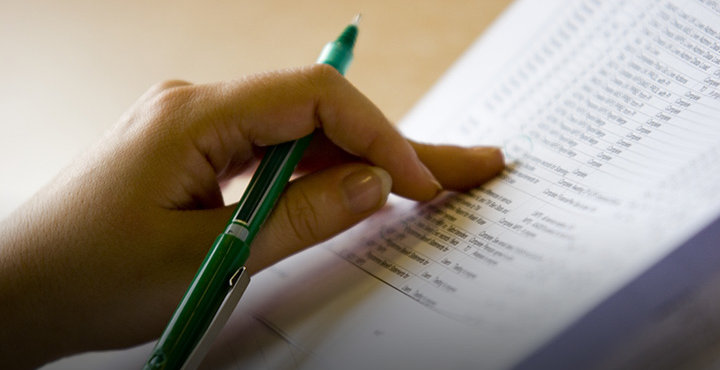Written by Chandra Clarke
Proofreading a paper before you turn it in can mean the difference between an unacceptable essay and one that will be praised and rewarded with an excellent grade. Too often, however, students skip this crucial step when writing.
Proofreading a paper is just as important as any other aspect of writing; in fact, the process is instrumental in getting your ideas across in an accessible and logical manner.
Before You Proofread
Before performing a final proofread, it's important to do an in-depth edit. Editing your paper allows you to examine how your ideas connect with each other in terms of organization, development, and focus.
If a particular argument or fact would be better suited for another section of your paper, you can rearrange the content so that similar ideas are presented in the same paragraph or in proximity to each other. This extra considersation can give your paper more order.
Also, take the time to rewrite or revise any part of your paper that you're unsatisfied with or that you think could be written more convincingly. Editing allows you to identify areas that could be supported by more facts or better arguments. Add more content as you see fit, as long as it's relevant and within word limit restrictions.
Save newer versions of your work as separate files so that you'll have a record of your drafts and a point of reference if you decide to revisit certain ideas. Once your paper's content and flow are the best they can be, you can dive into proofreading, which includes looking for errors in punctuation, spelling, grammar, and word choice.
The Benefits of Proofreading
Performing a thorough proofread of your work will give you the chance to fix any errors that remain and that may cloud your intended meaning. Though many computers and word processors offer spell-checkers, they cannot catch tricky and commonly misused words, such as homophones, the way that you can if you proofread and give your paper a word-by-word review.
Grammar mistakes can also be caught and fixed, especially when reading your work aloud. Since misplaced punctuation can change the entire meaning of a sentence, it's also important to ensure that these little marks have been expertly employed.
Good spelling, grammar, and punctuation are extremely important; it's not uncommon for some teachers to mark down a paper an entire letter grade if it's obvious that it hasn't been properly proofread.
Address every error, no matter how big or small. You should minimize the potential for misunderstanding by choosing the right words to communicate your ideas. Never underestimate the importance of clarity; when faced with the choice to use a big, vague word or a short, clear one, always choose the latter.
During the editing process, academic papers or theses that are highly dependent on research need to have their sources vetted for accuracy and legitimacy. Verify that your paper is based on credible information. Then, in the proofreading stage, check your citations and footnotes to ensure their proper placement and formatting.
Proofreading Tips
Certain strategies can serve you well when it comes to proofreading. Putting your paper aside for a bit can help you look at your work with fresh eyes when you decide to review it. You can also read your paper from the conclusion to the introduction to give yourself a new perspective.
If you're writing a paper that has to be presented in a certain style, such as Modern Language Association (MLA) style, it's a good idea to have others who are familiar with that style review your paper to see if it meets the prescribed standards. They may be able to identify mistakes that you missed, especially if your familiarity with MLA style is limited.
Get crafty with your proofreading techniques to ensure that you're handing in an impressive paper. Here are three practical proofreading tactics:
- Consider printing out your work or altering the document formatting; this can help you view your work as if it were written by a classmate.
- Place a separate piece of paper over your work to block out unread pieces of text while you proofread each line to help you concentrate on each word of your paper individually.
- If you or your teachers have identified certain weaknesses in your writing, review your work with the goal of addressing those areas. For example, writers who find punctuation problematic can print out their papers and highlight or circle punctuation marks to determine if they're both necessary and appropriate.
Additional Resources
To learn even more about proofreading, visit the following links:
- Where to Begin When Proofreading
- Editing and Proofreading
- How to Proofread
- General Strategies for Editing and Proofreading
- Revising vs. Proofreading: What's the Difference?
- College Writing Center Proofreading Tips (PDF)
- Editing and Proofreading Strategies
- Revision and Proofreading: How to Revise Your Own Writing (PDF)
- Revision Strategies
About the Author
 Chandra is the founder and president of Scribendi. She holds a BA in English and an MSc in Space Exploration Studies. Her lifelong devotion to the written word started when she joined The Chatham Daily News as a regional stringer. She then worked as a reporter/photographer for a large chain of weeklies before becoming the managing editor of an independent paper, a post she held for two years before striking out on her own. She pens a weekly humor column and has written dozens of short stories, newspaper articles, and magazine articles. She is an enthusiastic supporter of space exploration and scientific research, and is the author of Be the Change: Saving the World with Citizen Science.
Chandra is the founder and president of Scribendi. She holds a BA in English and an MSc in Space Exploration Studies. Her lifelong devotion to the written word started when she joined The Chatham Daily News as a regional stringer. She then worked as a reporter/photographer for a large chain of weeklies before becoming the managing editor of an independent paper, a post she held for two years before striking out on her own. She pens a weekly humor column and has written dozens of short stories, newspaper articles, and magazine articles. She is an enthusiastic supporter of space exploration and scientific research, and is the author of Be the Change: Saving the World with Citizen Science.
Image source: Prawny/Pixabay.com









